In a world that often glorifies hustle and productivity, sleep can sometimes take a back seat. However, quality sleep is fundamental to physical health, mental clarity, and emotional well-being. Sleep hygiene refers to habits and practices that promote consistent, restorative sleep. By mastering sleep hygiene, you can improve your overall quality of life. Here’s a comprehensive guide to achieving better rest and rejuvenation.
Why Sleep Hygiene Matters
Poor sleep can lead to a host of issues, including reduced concentration, weakened immunity, and increased risk of chronic conditions such as heart disease and diabetes. Conversely, good sleep hygiene supports your body’s natural sleep-wake cycle, or circadian rhythm, ensuring you wake up feeling refreshed and ready to take on the day.
Building Healthy Sleep Habits
1. Establish a Consistent Sleep Schedule
- Go to bed and wake up at the same time every day, even on weekends.
- Consistency reinforces your circadian rhythm, making it easier to fall asleep and wake up naturally.
2. Create a Relaxing Bedtime Routine
- Engage in calming activities like reading, meditation, or gentle stretching before bed.
- Avoid stimulating activities such as working, exercising, or using electronic devices.
3. Limit Exposure to Blue Light
- Reduce screen time at least an hour before bedtime.
- Use blue light-blocking glasses or apps if you must use electronic devices in the evening.
4. Be Mindful of Diet and Caffeine Intake
- Avoid heavy meals, alcohol, and caffeine close to bedtime.
- Opt for sleep-friendly snacks like bananas, almonds, or chamomile tea if you’re hungry late at night.
5. Exercise Regularly
- Engage in physical activity during the day to promote better sleep at night.
- Avoid intense workouts too close to bedtime, as they may be overly stimulating.
Designing a Sleep-Friendly Environment
1. Optimize Your Bedroom for Sleep
- Keep your bedroom dark, quiet, and cool (around 60-67°F or 15-19°C is ideal).
- Use blackout curtains, white noise machines, or earplugs to eliminate distractions.
2. Invest in Comfortable Bedding
- Choose a supportive mattress and pillows that suit your sleep style.
- Use breathable, soft sheets and blankets to enhance comfort.
3. Limit Bedroom Activities
- Reserve your bed for sleep and intimacy only to train your brain to associate it with rest.
- Avoid working, watching TV, or scrolling on your phone in bed.
Recognizing and Addressing Sleep Disruptors
1. Stress and Anxiety
- Practice stress management techniques such as deep breathing, journaling, or yoga.
- Consider cognitive-behavioral therapy for insomnia (CBT-I) if stress significantly impacts your sleep.
2. Sleep Disorders
- If you consistently struggle with falling or staying asleep, consult a healthcare provider.
- Conditions like sleep apnea or restless leg syndrome may require medical attention.
3. Environmental Factors
- Identify and eliminate factors like noise, temperature extremes, or uncomfortable bedding.
Additional Tips for Better Sleep
- Nap Wisely: Keep naps short (20-30 minutes) and avoid napping late in the day.
- Expose Yourself to Natural Light: Spend time outdoors during the day to regulate your circadian rhythm.
- Track Your Sleep: Use a journal or app to monitor your sleep patterns and identify areas for improvement.
- Stay Patient: Developing good sleep hygiene takes time. Stick to your routine, and results will follow.
Conclusion
Mastering sleep hygiene is a journey towards improved health, productivity, and overall well-being. By adopting consistent habits, creating a supportive environment, and addressing potential disruptors, you can unlock the transformative power of restful sleep. Prioritize your rest—your body and mind will thank you.
